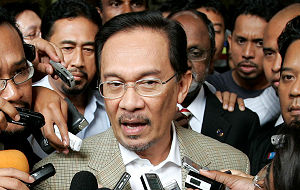Press Note
Immediate action called for Anwar Ibrahim and Malaysian opposition MPs
Geneva, 2 July 2015

An IPU human rights delegation to Malaysia has called for the jailed former opposition leader Anwar Ibrahim to receive prompt medical attention as and when required after visiting him in prison this week.
Although the three-day IPU mission, which concluded yesterday, acknowledged efforts in addressing Anwar’s health problems, it urged authorities to allow follow-up care requested by doctors in early June after he underwent hospital treatment. The team was also concerned to hear from the former MP that he was being allowed almost no contact with other prisoners.
Anwar, 67, is serving a five-year sentence after losing a lengthy legal battle in February to clear his name of sodomy charges. After discussions with government, parliamentary and judicial authorities, as well as Anwar’s family, the IPU mission reiterated concerns about serious alleged flaws in the legal proceedings which led to his conviction. A planned judicial review of his case before the Federal Court was an opportunity to offer proper redress, the mission said.
The three-member delegation from IPU’s Committee on the Human Rights of Parliamentarians also called for the dismissal of charges and investigations against eight opposition MPs, including Anwar’s daughter Nurul Izzah Anwar. Some of the MPs had taken part in demonstrations, while Nurul Izzah had been briefly arrested after criticising the judiciary during a speech in parliament.
The IPU mission said it believed the charges brought under the Sedition Act and other criminal provisions ran counter to the MPs’ rights to freedom of expression and assembly. The mission raised serious concerns about the Sedition Act itself, concluding that it continued to challenge fundamental freedoms despite recent amendments.
The delegation, including MPs from Chile and Senegal, found that the amended Act had done nothing to promote legal clarity and left the door open for arbitrary arrests and prosecutions in the future.
The IPU mission, which took place at the invitation of the Malaysian authorities, was encouraged by indications from various government officials that the Act would be revisited. It expressed the hope that a Federal Court review would reject the Act as unconstitutional. This would remove the threat of action against MPs as they exercised their right to speak and assemble freely.
“Stability will not come through the use of repressive measures. The best guarantee for peace and harmony in a multi-racial and multi-religious society like Malaysia is for differences to be voiced openly, and to have effective conflict resolution mechanisms that channel tensions whenever they arise,” said Juan Pablo Letelier, the Chilean Senator who led the IPU human rights mission.
The delegation, which is urging the Malaysian authorities to ratify and implement all key international human rights treaties, will present a full report on the mission to IPU Members in October.
The Inter-Parliamentary Union (IPU) is the global organization of national parliaments. It works to safeguard peace and drives positive democratic change through political dialogue and concrete action. |
For further information, contact: Jemini Pandya, Tel: +41 22 919 4158, email: jep@ipu.org or press@ipu.org
